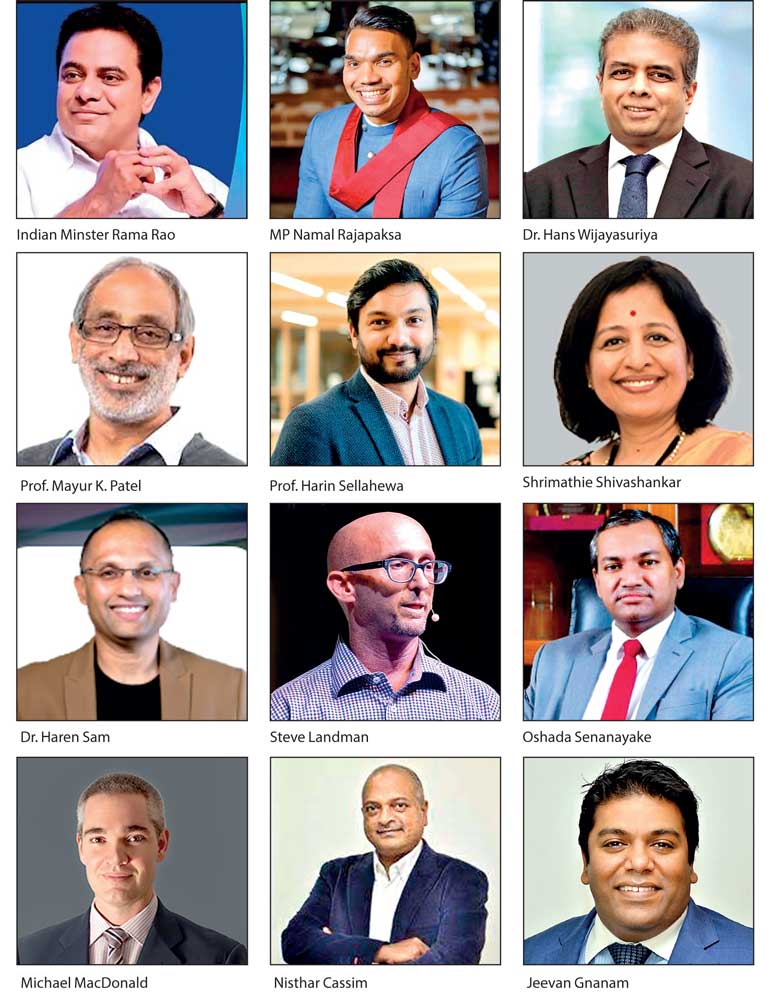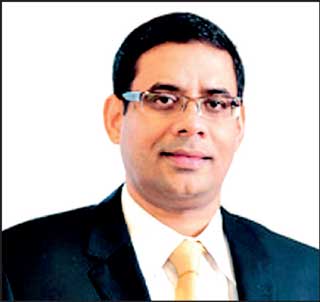Saturday Feb 28, 2026
Saturday Feb 28, 2026
Friday, 31 December 2021 00:00 - - {{hitsCtrl.values.hits}}

 |
| Dinesh Weerakkody
|
The CEO Forum of the Sri Lanka Institute of Directors (SLID) together with the International Chamber of Commerce (ICC) recently organised a webinar to deliberate the strategies and actions required to boost economic
growth and achieve Sri Lanka’s Vision 2025 of positioning itself as a technology hub in the Indian Ocean.
Minister of Youth and Sports, Development, Coordination and Monitoring and State Minister of Digital Technology and Enterprise Development Namal Rajapaksa and Minister of Municipal Administration and Urban Development, Industries and Commerce, and IT of Telangana, India Rama Rao were the keynote speakers. Daily FT Founding Editor/CEO Nisthar Cassim and VeracityAI/Digital Reality Group CEO/Founder Jeevan Gnanam moderated the eminent panel comprising of Axiata Group EVP and CEO, Telecommunications Business Dr. Hans Wijayasuriya, University of Greenwich UK Professor, Computational Science and Engineering and Director – Partnerships and Internationalisation Prof. Mayur K. Patel, University of Buckingham UK Dean of Computing, Law and Psychology Prof. Harin Sellahewa, HCL New Vistas Corporate VP and Program Director Shrimathie Shivashankar, AWS New Zealand Head of Territory Dr. Haren Sam, Kiu Global Founder/CEO Steve Landman, ICTA Chairman and TRCSL DG Oshada Senanayake, and Huawei AP Chief Digital Officer/Executive Consultant Michael MacDonald.
Minister Namal Rajapaksa stated that the policy manifesto of the President, ‘Vistas of Prosperity and Splendour’ mentions the importance of a digital inclusive Sri Lanka and the key specific objectives to be achieved during his tenure and that it is planned to name 2022 as the Digital Year. “Sri Lanka will draft policies allowing transactions with digital currencies, focus on empowering communities with digital education and build a digitally inclusive Sri Lanka. Inclusion should be the heart of digital transformation. We need to enable and embed inclusive objectives in internet access, digital skills, digital financing, and ecommerce, the four core foundations of the digital economy. The entire education system will be digitalised and necessary knowledge, training and infrastructure will be provided to schools, teachers, and parents. To remain competitive globally technology must be integrated with every sector of the economy be it agriculture, industry or services,” he said.
Minister Rama Rao said that the value of human capital available is one of the main reasons considered by large corporations in the world to set up their massive offices and R&D centres in Hyderabad and Telangana. Over the last two decades, their evolution from a tech perspective has been from a back office to being a backbone, driven by a systemic effort on education which created a massive talent pool as well as a very conducive environment for attracting investments with a high level of ease of doing business, and most importantly the ability to adapt to changing times, technologies and needs has helped them to stay ahead of the curve. “Innovation can be an area where Sri Lanka can excel as a lot of youngsters are exposed to the world with technologies and can take pride in coming out with their own startup,” he added.
“One of the key challenges is broadband coverage which is currently being addressed and the budget has approved to connect 10,000 schools via fibre optics. Many regulatory changes are required to enable large tech companies to invest in Sri Lanka and many policy decisions are being taken. The legal framework such as cybersecurity and data protection, are to be presented to parliament. We have a roadmap and the commitment from the President, Prime Minister and the Cabinet, and the Government is very clear on the digital transformation of the Government sector. The finance minister has focused the budget on the three pillars,” said Minister Namal Rajapaksa responding to questions from the moderator.
Dr. Patel said that the education system in Sri Lanka has had a long gestation period and changes in education is required to support the digital transformation and tech hub status of Sri Lanka and added that the young generation needs to be educated and enthused very quickly. “The talent pool is not just in Colombo or big city hubs; it is right across the country. You need to connect them affordably and inclusively. Young people need to think freely to come up with the technology and innovation that is needed for the future.” Prof. Sellahewa said that the most important factor to achieve the hub status is the human capital, highly skilled thinkers and that Sri Lanka must focus on how to keep them in the country. “Over the next two-five years Sri Lanka would face a big challenge of highly skilled thinkers wanting to move out as there are so many opportunities out in the world. It is all about quality of life and not just having a job. Since Sri Lanka is a beautiful place, you can attract and keep the right talent. The right environment is crucial.”
Shivashankar said that reforms should be brought in for bigger universities to move away from the typical norm of four years of education and putting people to jobs and move into work integrated higher education and that students should be moulded early, they should earn, learn and continue to learn.
Michael MacDonald said that the country should be willing to invest in infrastructure and there are some real opportunities to leapfrog some technologies to connect communities and bridge the digital divide in a more effective way. Steve Landman said technology, knowledge transfer is one of the biggest components for a place, country to thrive. What countries like Vietnam do very well to escalate rapidly is that they send people overseas to work for large tech companies who then come back because they see an opportunity to improve lives of the people in their own country. From a policy standpoint, Vietnam allows five years tax holiday for startups and to encourage FDI.
Dr. Haren Sam said that AWS looks at three pillars when building ecosystems across the world which are infrastructure, skills, and innovation to solve problems and building experiences that matter. “We work backwards from the problem to the solution and encourage building brands which transcend the boundaries of the country.”
Dr. Hans Wijayasuriya said that the concept of a hub itself needs to be understood very clearly in the context of exponential changes in the tech landscape. “A hub in the past is where we think of some degree of physical manifestation such as asset heavy physical infrastructure which draws people to it to enable or consume services. This might transform into a complete virtual situation where the dimensions or critical factors of success would be very different to those in a physical context. This is an opportunity for smaller countries as when you move from physical to virtual, the disadvantage of scale, legacy goes away and you can truly be a citizen of a very flat world enjoying plural access, likewise talent from everywhere else would have access as well,” he said, citing Uber, Airbnb as hubs for transportation and accommodation globally.
Oshada Senanayake said that the panel resonated Sri Lanka’s way forward very well. “We need to look at the key elements of digital transformation. We need to change our perspective from a tech first approach to a citizen experience first approach for digital government and transform certain aspects of citizen services. As a country now we have an institutional framework in place with a Ministry of Technology under which we have key strategic organisations consolidated with TRC focusing on connectivity, ICTA focusing on driving the common agenda and the overall digital transformation strategy, CERT coming into bring the cybersecurity readiness of the country.
“According to the ITU, Sri Lanka’s fixed broadband and mobile broadband affordability of internet is ranked 20th and 13th respectively and mobile voice is ranked 7th globally. Digital inclusivity is all about affordability, accountability, and digital skills. While we boast of a high literacy rate in Asia, we need to focus on digital literacy and the human capital pillar. A lot is being done to develop the startup ecosystem as well,” he added stating that they are well on course in setting Sri Lanka as a tech hub with a value proposition that will set us apart from other destinations.
“As a regulator we have to be an accelerator and a catalyst for digital transformation. From an accessibility perspective, as a country we are looking the Digital Nomad program to leverage on the tremendous environment we can have to pivot around the new phenomena of remote work which requires new communications technologies. They will not be traditional workplaces, they will work from exotic locations in Sri Lanka cut across the island which will require universal connectivity and SpaceX, OneWeb has a tremendous opportunity to bring that element into the country. Once we activate and orchestrate these ahead of the curve facilities and technology, it’s just a matter of leveraging them whether it is private or public sector.
“There is tremendous momentum that has been created moving forward. We also have a tremendous geo advantage in terms of satellite enablement due to the expanded contact points based on our positioning. These are some of the key imperatives we need to leverage as a country, and we are well on our course to reach them,” he further stated in response to the question of what the private sector can expect from the exponential game changers for Sri Lanka.”